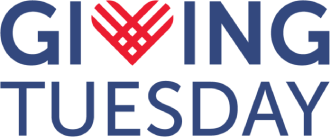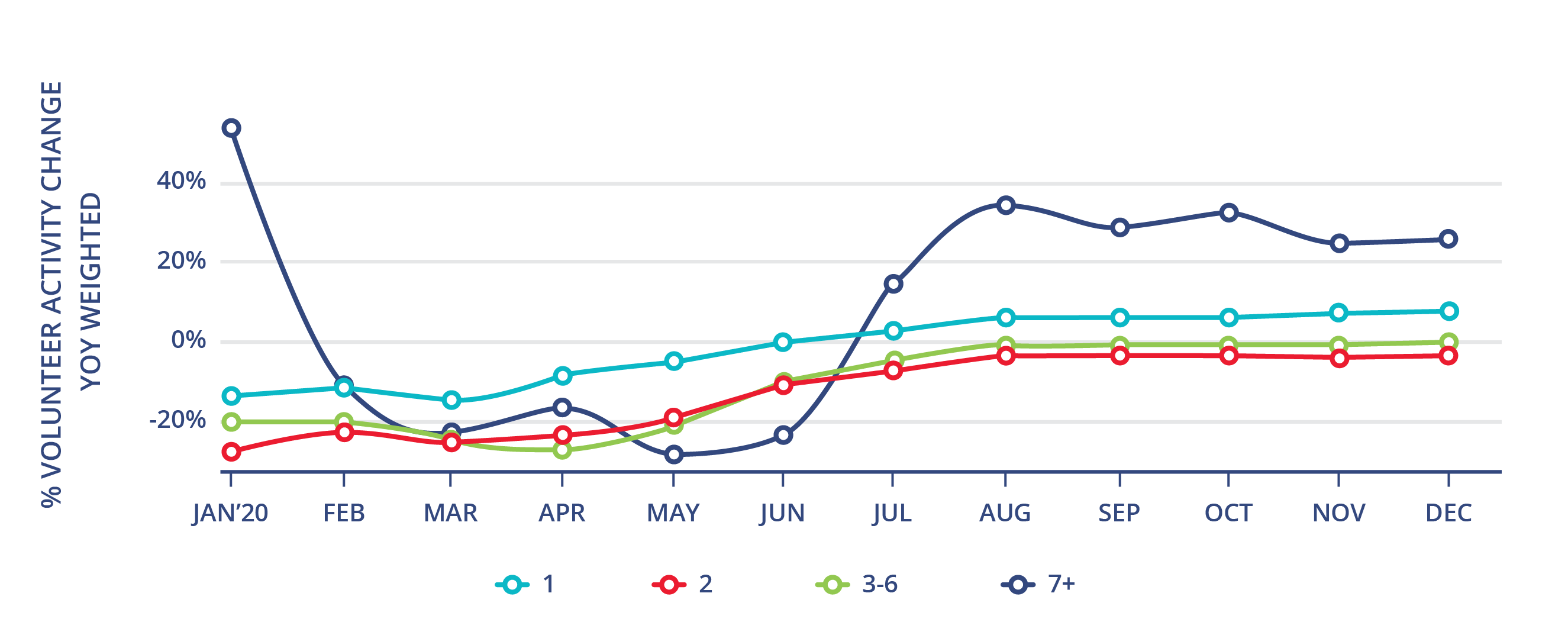Giving in 2020 was highly volatile with a marked increase in donor mobility. In our Lookback Report released earlier this year, we examined charitable giving data to better understand the fluctuations in, and drivers of, charitable giving during a year of crisis to pinpoint risks and opportunities for organizations moving forward. But we recognized this was just one part of the story about the effects of, and response to, crisis. The GivingTuesday Data Commons is committed to examining a wide range of behavior and actions to better understand the full spectrum of giving beyond financial contributions and to acknowledge and encourage the varied ways in which people around the world express their generosity—during and beyond times of threat.
One obvious next step was to take a look at how people were giving their time during the pandemic. As social distancing and health precautions became the norm for much of the year, many traditional in-person volunteer opportunities were upended, forcing organizations and volunteers to adapt. To explore what we could learn about volunteer engagement in 2020, GivingTuesday is teaming up with VolunteerMatch to gain additional insights from volunteer activity data. GivingTuesday and VolunteerMatch are collaborating to analyze 2020 volunteer data to see how volunteer trends fared when compared to 2019 and to understand how these trends relate to patterns in financial contributions over the same period.
Our collaboration looks at patterns of volunteering for 501(c)(3) organizations in the United States. It’s important to note that these data are just a snapshot of overall volunteer behavior—our view is limited to the registered volunteer activity recorded by one platform, and this data doesn’t capture the myriad ways that people stepped up beyond formally recorded actions. Still, this work provides an important view that helps us understand some aspects of volunteer engagement in 2020 and presents us with additional questions that we are eager to explore with our collaborators across sectors.
About the Data
Our work leverages data from VolunteerMatch which includes the analysis of 2,263,629 matched volunteer opportunities, 2,065,428 volunteers present over four years of data (2017–2019).
We are also looking at individual giving data from the GivingTuesday Data Commons 2020 Lookback Report to compare trends during the same time period and to more clearly illustrate the effects of 2020 on a typical organization. We are referencing survey research to inform our understanding of the trends.
Initial Findings
When we examined volunteer growth, frequency, retention, and volunteer type, we have found a few key trends:
- Not all organizations fared equally when it came to volunteer activity. In 2020, volunteering showed nearly identical trends to last year’s charitable giving, with fewer organizations getting volunteers, but those organizations that continued to engage volunteers saw growth from 2019 levels.
- There was significant volunteer mobility in 2020. The data show that people were shifting when, where, and how they gave their time to organizations, a trend that mirrored the unprecedented donor mobility of 2020.
- “Repeat” volunteering showed sizable growth in 2020. This is a major point of departure from fundraising, where we saw growth, but at a dramatically different scale.
Despite the challenges, the sector started to see recovery in volunteer activity by the end of the year, perhaps driven by a shift to virtual volunteering, representing an opportunity for organizations to be more agile and resilient in the future.
This initial look prompts us to ask more questions about the data. We want to understand more about the degree of volunteer mobility and the difference in volunteer types. We also aim to explore questions around individual patterns of volunteer action, how organization size and cause area factored into volunteer engagement trends, and how the availability of virtual volunteering opportunities impacted volunteer frequency and an organization’s overall success.
Why this work is important
This collaboration with VolunteerMatch is just ramping up, and we are excited to bring more detailed analysis and new research collaborators to the work in the coming months. Our work together highlights an incredible opportunity for expanded data analysis and learning for the sector and opens up new avenues of discovery and innovation.
To research work like this, the GivingTuesday Data Commons has created an adaptable data infrastructure to examine a wider range and type of data. It is also our desire to ensure open access and to spur accelerated progress in answering questions of mutual interest and shared impact. Data, analysis, and learning materials are free to access and explore via the GivingTuesday Data Commons. Practitioners, trainers, developers, and platforms can use this information to guide their work and add to it.
This type of collaboration will lead to more sharing and more innovation as researchers and data scientists work to build better systems and solve challenges together. All of this activity will support a faster recovery from the shocks of this crisis and help us collectively build an increased understanding of best practices and interventions that will ensure greater resilience for the sector.
What to expect next
This snapshot of volunteer trends presents some interesting questions that we should explore to help community organizers, funders, and the sector better navigate crises, increase resiliency, and engage supporters to grow giving worldwide. The GivingTuesday Data Commons, in collaboration with VolunteerMatch and other partners, will publish more detailed findings on volunteer behavior and its relationship to other types of giving and civic participation.
VolunteerMatch will release additional research and insights on volunteer behavior, trends in giving time, and volunteer engagement best practices. This research will include a closer look at virtual volunteer opportunities and the ways organizations and communities can adapt their programs to engage more people in volunteering activities.
To enable and encourage further collaborative research on this topic, this data and the initial analysis will be available to explore in an online dashboard via the GivingTuesday Data Commons. We’ll also provide opportunities for researchers, analysts, and other interested parties to collaborate on further volunteer behavior analysis through an open, shared project space on the Data Commons platform.
As we continue to explore volunteer trends and other giving data, it is clear that there is a gap in our collective understanding of all the ways people take action to build the communities they want to live in. There is a rich diversity in giving that has yet to be fully acknowledged, let alone examined. These generous behaviors go beyond one type of giving and form an interconnected generosity ecosystem that exists globally, while also being expressed in unique ways in specific communities and cultures. We are committed to data work that offers more insights on nonfinancial as well as non-nonprofit support, including a more holistic view of volunteer behavior and civic participation, including community action, mutual aid, voting, advocacy, and other prosocial behaviors.
To that end, the GivingTuesday Data Commons is launching the Citizen Action Research Hub, a new collaborative effort to measure and understand the many ways that individuals commit their time to build and strengthen communities. The initiative is led by GivingTuesday, with support from its global network of leaders and collaborators. Key partners and research collaborators include VolunteerMatch, Golden, the U.S. Office of Personnel Management, Stanford PACS, and the Center for International Development at the Harvard Kennedy School (Harvard CID), along with the Coalition for Volunteer Impact.
Research hubs on the GivingTuesday Data Commons platform provide collaborative workspaces for researchers and practitioners to collect and access data, conduct analyses, produce findings, document methodology, disseminate insights, and iterate on one another’s work. The Citizen Action Research Hub will include volunteer behavior and other data, dashboards, data visualization tools, and a suite of data analysis resources.
—Woodrow Rosenbaum, Chief Data Officer
How to get involved
Are you a researcher, analyst, platform developer, or someone passionate about using data for good? We’d love to hear from you. Visit data.givingtuesday.org to learn more about our workspaces or contact us to find out how you can support this work.




